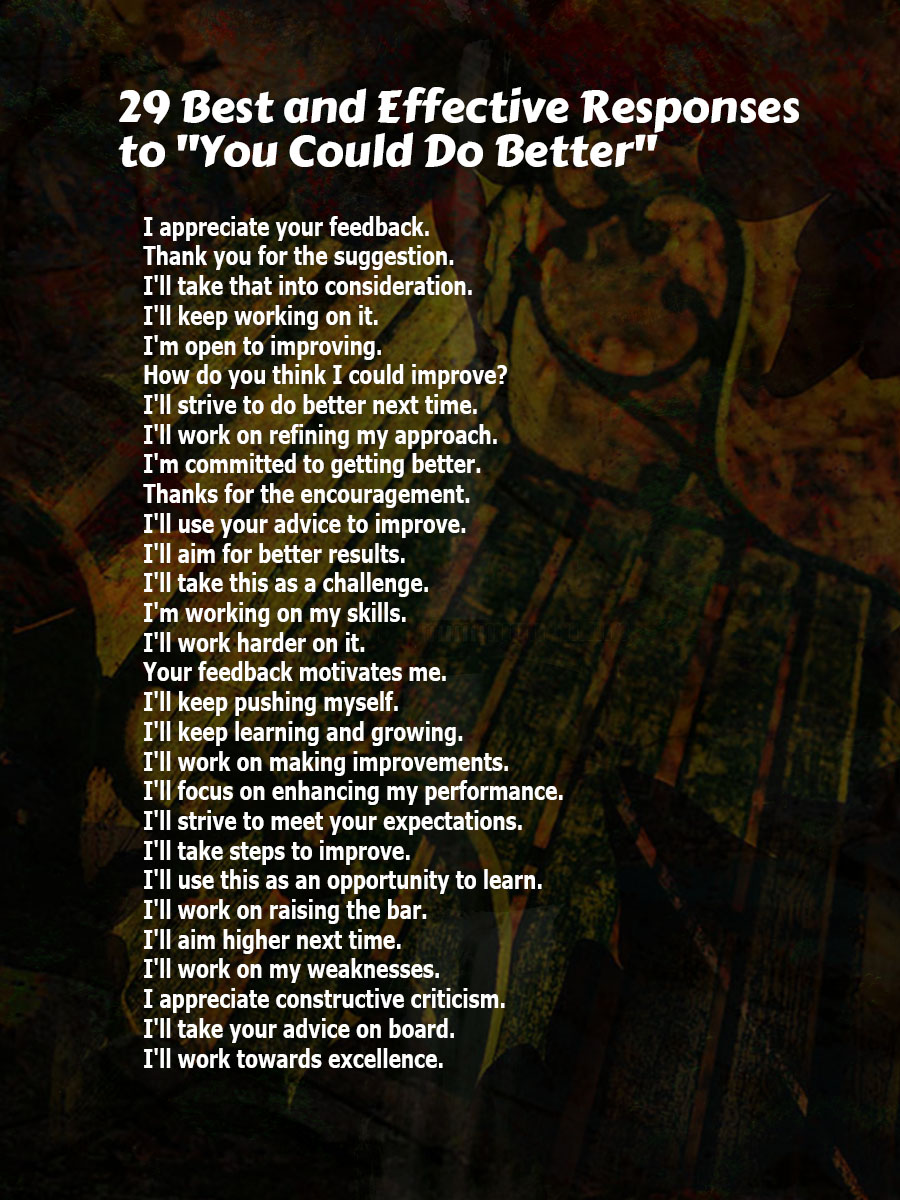Have you ever been told ‘You could do better’? It’s a phrase that can leave us feeling unsure or motivated. In this article, we explore positive ways to respond when faced with this comment.
Whether it’s at work, school, or in personal goals, each suggestion aims to turn criticism into opportunity. From setting clearer goals to embracing feedback, these responses are designed to empower and inspire.

Here are 29 Great Ways to Respond to “You Could Do Better”:
I appreciate your feedback.
Thank you for the suggestion.
I’ll take that into consideration.
I’ll keep working on it.
I’m open to improving.
How do you think I could improve?
I’ll strive to do better next time.
I’ll work on refining my approach.
I’m committed to getting better.
Thanks for the encouragement.
I’ll use your advice to improve.
I’ll aim for better results.
I’ll take this as a challenge.
I’m working on my skills.
I’ll work harder on it.
Your feedback motivates me.
I’ll keep pushing myself.
I’ll keep learning and growing.
I’ll work on making improvements.
I’ll focus on enhancing my performance.
I’ll strive to meet your expectations.
I’ll take steps to improve.
I’ll use this as an opportunity to learn.
I’ll work on raising the bar.
I’ll aim higher next time.
I’ll work on my weaknesses.
I appreciate constructive criticism.
I’ll take your advice on board.
I’ll work towards excellence.
See Also: 32 Ways to Say When Someone Calls You Hot Over Text
Understanding The Feedback
Interpreting The Critique
When someone tells you that you could do better, it’s important to avoid jumping to conclusions and instead focus on understanding the intention behind the statement. Here are a few key points to keep in mind when interpreting the critique:
- Reflect on the context: Consider the situation in which the feedback was given. Was it related to a specific task, project, or skill? Understanding the context will help you gauge the relevance and validity of the feedback.
- Look for specifics: Pay attention to any specific points mentioned in the critique. These details can provide valuable insights and give you a clearer understanding of what areas to work on.
- Consider the source: Take into account who the feedback is coming from. Is it from a credible authority or someone with expertise in the field? Evaluating the source will help you determine the value and credibility of the feedback.
Evaluating The Constructiveness
Not all feedback is constructive or helpful. It’s essential to evaluate the feedback and ascertain whether it will truly contribute to your growth and improvement. Here are a few guidelines to help you evaluate the constructiveness of the feedback:
- Assess the intention: Consider whether the feedback is provided with the intention to genuinely help you improve or if it is merely a criticism without substance. Constructive feedback should offer specific suggestions or ideas for improvement.
- Objective versus subjective viewpoints: Remember that feedback can sometimes be subjective, based on personal preferences or opinions. Differentiate between objective suggestions that can lead to tangible improvements and subjective viewpoints that may not align with your own goals or values.
- Consider multiple perspectives: Seek feedback from different sources to get a well-rounded view of your performance. This will help you evaluate if the suggestions are consistent or if there are varying opinions that may impact your decision to act upon them.
By understanding the feedback received and evaluating its constructiveness, you can navigate through potentially useful insights and effectively respond to the statement “You could do better.” Remember, feedback is an opportunity for growth, and by approaching it with an open mind, you can make meaningful progress on your journey to success.
See Also: 35 Ways to Reply Back to Hope You Had a Great Weekend
Seeking Clarification
When faced with feedback that you could do better, seeking clarification is the first step towards improvement. Understanding what exactly needs enhancement is crucial for your growth.
Asking For Specific Examples
Directly ask for specific examples of where you can improve to gain better insight and focus on the areas that require attention.
Requesting Elaboration On Expectations
Ask to elaborate on expectations to get a clearer understanding of what standards or outcomes need to be met, enabling you to align your efforts accordingly.
Self-reflection
Reflect on your achievements and areas that need improvement.
Consider how you can enhance your skills and abilities.
Use self-assessment tools to identify strengths and weaknesses.
- Make a list of areas where you can do better.
- Seek feedback from others to gain different perspectives.
- Set specific goals for improvement in targeted areas.
Seeking Guidance
Explore constructive ways to handle feedback; view “You Could Do Better” as an opportunity for growth and learning. Embrace guidance positively to improve skills and achieve your full potential.
Soliciting Advice From Mentors Or Colleagues
When faced with the feedback “you could do better,” seeking guidance is an effective way to grow personally and professionally. Reaching out to mentors or colleagues who have experience and expertise in your field can provide invaluable insights and strategies for improvement.
Approaching a mentor can be done in a respectful and professional manner. You can ask for their opinion on specific areas you want to improve. For example, if you received feedback on your presentation skills, you can request guidance on techniques to enhance your public speaking abilities.
Furthermore, engaging with colleagues who excel in areas where you strive to improve can offer different perspectives. Taking the opportunity to discuss their approaches, challenges faced, and lessons learned can help you gain a deeper understanding of your own strengths and weaknesses.
Exploring Training Or Skill Development Opportunities
An alternative way to respond to “you could do better” is by exploring training or skill development opportunities. This proactive approach demonstrates your commitment to self-improvement and growth.
Begin by identifying the specific areas that need improvement based on the feedback received. Once you have pinpointed these areas, you can then search for relevant training programs, workshops, or courses that cater to your needs.
Consider areas such as communication skills, time management, leadership, or technical expertise. Research reputable organizations or institutions that offer these training opportunities and compare their offerings to find the one that aligns with your goals and preferences.
Additionally, don’t overlook online resources and platforms that provide free or affordable courses. Websites like Coursera, Udemy, or LinkedIn Learning offer a wide range of topics and courses that can be completed at your own pace.
Conclusion
By seeking guidance from mentors or colleagues and exploring training or skill development opportunities, you can respond effectively to the feedback of “you could do better.” These proactive steps will not only demonstrate your commitment to growth but will also equip you with the knowledge and skills necessary to excel in your chosen field.
See Also: 36 Amazing Ways to Respond When a Girl Rejects You
Constructive Response
When receiving the feedback “you could do better,” consider it as a constructive response. Approach it with a growth mindset, seeking specific and actionable advice to improve. Embrace the opportunity to learn and grow, turning the critique into a positive force for progress.
Acknowledging The Feedback
When responding to “You Could Do Better,” it’s important to acknowledge the feedback in a positive and receptive manner. Express appreciation for the input and demonstrate genuine interest in understanding how improvements can be made.
Proposing Actionable Plans For Improvement
Following the acknowledgment, it’s crucial to propose actionable plans for improvement. Collaboratively outline specific steps to address the identified areas of improvement. This ensures that the feedback is met with a proactive approach.
Implementing Feedback
When it comes to receiving feedback, it’s important to implement it effectively in order to improve and grow. Implementing feedback involves setting specific goals and creating an action plan to address the areas that need improvement. Here’s how you can respond to “You could do better” by implementing feedback:
Setting Specific Goals
When you receive feedback indicating you could do better, the first step is to set specific goals to work towards improvement. Identify the specific areas that need improvement based on the feedback received. For instance, if the feedback pertains to improving communication skills, set a specific goal to enhance verbal and written communication within a certain timeframe.
Creating An Action Plan
After setting specific goals, you can then create an action plan to address the identified areas for improvement. This plan should include actionable steps that will help you achieve your goals. For instance, if the feedback highlights the need to improve time management skills, your action plan could involve scheduling specific blocks of time for various tasks and utilizing time management tools to track progress.
See Also: 25 Friendly Responses When Someone Makes Fun of Your Name
Overcoming Defensiveness
Discover effective strategies for overcoming defensiveness and responding constructively to feedback on how to improve. Gain insights into handling the common challenge of hearing “You could do better” with grace and openness.
Managing Emotions
When someone tells you that “you could do better,” it’s natural to feel defensive. However, allowing emotions to take control can hinder your growth and prevent you from benefiting from constructive feedback.
To overcome defensiveness, it’s essential to manage your emotions effectively. Take a moment to acknowledge your initial reaction, but then remind yourself that feedback is an opportunity for personal development.
Here are some strategies to help you manage your emotions when faced with criticism:
- Take a deep breath: Breathing deeply and slowly can help calm your nervous system and reduce feelings of defensiveness.
- Pause before responding: Instead of reacting immediately, take a moment to gather your thoughts and respond thoughtfully.
- Focus on the intention: Try to understand the intention behind the feedback. Remember that most people provide feedback with the intention of helping you improve.
Adopting A Growth Mindset
Overcoming defensiveness also involves adopting a growth mindset. This mindset emphasizes that abilities and intelligence are not fixed traits but can be developed through effort, practice, and learning. When faced with the remark “you could do better,” viewing it as an opportunity rather than a personal attack can help you respond more positively.
Here’s how you can adopt a growth mindset:
- Embrace challenges: See challenges as opportunities for growth and learning. Embrace them with enthusiasm rather than fearing failure.
- View failure as a learning experience: Instead of seeing failure as a reflection of your abilities, view it as a chance to learn and improve.
- Seek feedback: Actively seek feedback from others to understand how you can enhance your skills and abilities.

More Additional Response
I’ll make sure to improve on that.
I’ll work on my weak points.
I’ll strive for excellence.
I’ll take your feedback seriously.
I’ll focus on honing my skills.
I’ll aim to exceed expectations.
I’ll seek ways to enhance my performance.
I’ll take a fresh approach next time.
I’ll use this as a chance to grow.
I’ll work on being more efficient.
I’ll aim to deliver better results.
I’ll work on my technique.
I’ll invest more effort into it.
I’ll learn from this experience.
I’ll take steps to improve my performance.
I’ll push myself to do better.
I’ll strive to raise my standards.
I’ll work on refining my skills.
I’ll focus on continuous improvement.
I’ll take this as an opportunity to develop.
See Also: 30 Best Ways to Reply When Someone Says "I'm Here If You Need Anything"
Conclusion
Overall, responding to criticism with grace and a growth mindset is key. Emphasize the importance of constructive feedback and use it as an opportunity to learn and improve. Remember to stay calm, ask for clarification if needed, and take the feedback seriously.
By responding thoughtfully, you can foster a positive environment for growth and development.









